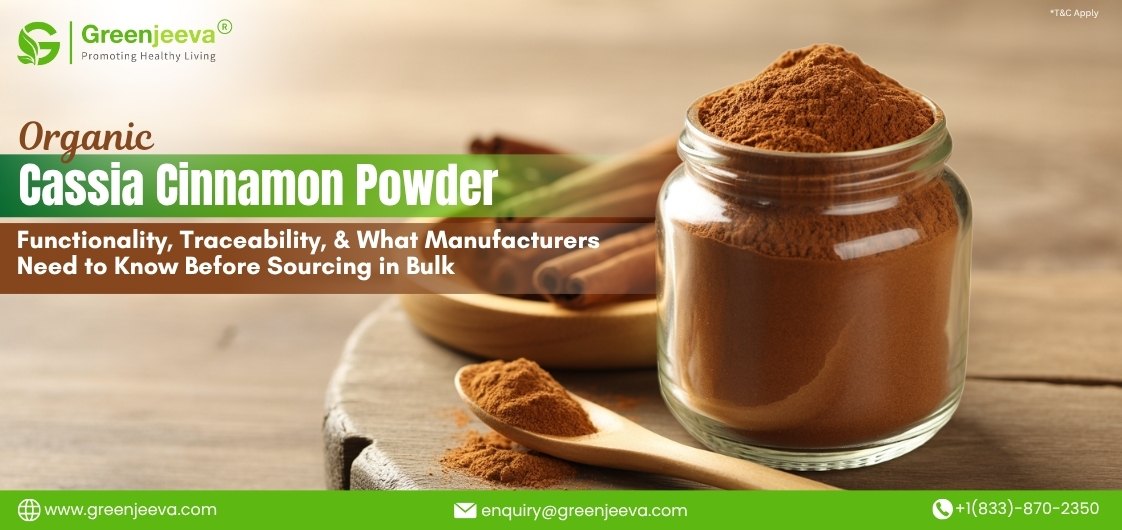
Every ingredient must justify its place, not just with flavor or function, but with documentation, certifications, and a solid sourcing story. For manufacturers, formulators, and sourcing leads, the pressure isn’t just to innovate. It’s to do so within tighter timelines, stricter compliance frameworks, and growing consumer scrutiny.
Organic cassia cinnamon powder is one of those rare ingredients that quietly checks all the right boxes. It brings formulation stability, aromatic depth, and natural preservation qualities, all while meeting key clean-label standards. But like most functional botanicals, its real value depends on how it's sourced, processed, and applied.
This blog breaks down what industry teams need to know to make sharper, faster decisions. From formulation insights to supplier evaluation tips, here's a practical, B2B-first look at how cassia cinnamon powder fits into your clean-label strategy, and what to look for when buying in bulk.
Cassia cinnamon powder contributes natural flavor, aroma, and functional characteristics that support texture stability and shelf preservation in clean-label formulations.
The powder is obtained from the bark of the Cinnamomum cassia tree, processed without synthetic carriers or additives when certified organic. It carries high levels of cinnamaldehyde, along with flavonoids and aromatic oils that can:
- Support microbial management in food and cosmetic matrices
- Add warmth and complexity to plant-based beverages, seasoning blends, or oral-care bases
- Contribute to oil and water-based product integrity
Its low moisture content and aromatic strength also make it useful in dry mixes, emulsions, and other format-sensitive formulations.
Yes. Organic cassia cinnamon powder is often used as a functional ingredient in clean-label preservation strategies, especially where artificial stabilizers are avoided.
It works well when formulators need to:
- Maintain flavor integrity without artificial preservatives
- Create multi-functional dry blends for seasoning, premixes, and shelf-stable beverages
- Introduce natural aromatics into emulsified or semi-solid formulations like pastes, scrubs, and gels
Because it is Non-GMO and available with certifications such as USDA Organic and FSSC 22000, cassia cinnamon root powder fits well into product lines targeting regulatory-sensitive or restricted-label markets.
Food, beverage, cosmetics, and oral-care industries are the primary users of cassia cinnamon powder at commercial scale.
Within these sectors, the powder is used in:
- Seasoning blends for snacks and sauces
- Functional teas and spice-infused plant-based milks
- Powdered beverage premixes
- Clean-label lip balms, scrubs, and soaps
- Natural toothpaste or mouth-cleansing solutions
Its aromatic profile and functional characteristics allow it to meet formulation needs while remaining compatible with restricted ingredient panels.
When sourcing in bulk, procurement and QA teams should verify traceability, quality control, and document readiness.
Key considerations include:
- Certifications: Ensure the supplier offers USDA Organic cassia cinnamon powder wholesale. Additional compliance like Kosher, Halal, and Non-GMO status increases applicability across product lines.
- Facility Standards: Choose an FSSC 22000 certified cassia cinnamon supplier to ensure process-level safety and consistency.
- Specification Sheet: Confirm batch-level documentation for moisture content, ash level, particle size, and presence of foreign materials.
- Origin and Processing: Some formulators prefer cassia sourced from Southeast Asia due to bark quality and oil content. Check whether it is steam-treated or mechanically milled.
- Consistency: Evaluate whether the supplier can maintain organoleptic and physical characteristics across multiple lots.
Certifications validate quality, compliance, and market readiness—especially for exports or distribution through clean-label retailers.
Look for suppliers that provide:
- USDA Organic documentation for organic labeling
- FSSC 22000 certification for food safety compliance
- Non-GMO verification for transparency in natural product lines
- Kosher and Halal certifications for region- or culture-specific product deployment
Such credentials are increasingly part of the ingredient checklist in R&D approval workflows.
Organic cassia cinnamon powder has proven itself as more than a flavoring agent. It plays a practical role in natural preservation systems and meets the evolving standards of clean-label product development. For manufacturers and formulation teams, its ability to integrate into both food and cosmetic applications makes it a valuable asset across categories. But functional potential is only one part of the equation. Choosing the right bulk supplier—one that meets certifications, ensures batch consistency, and provides complete specification support—is essential for scaling formulations confidently. As clean-label expectations rise and regulatory scrutiny intensifies, partnering with a certified, documentation-ready supplier is a competitive advantage.
Why Partner with Green Jeeva
Green Jeeva is a reliable supplier of certified herbal powders, including USDA Organic cassia cinnamon powder. We support manufacturers, formulators, and sourcing heads with spec-ready documentation, real-time inventory status, and compliance-driven ingredient supply.
Whether you're building natural food products, cosmetic applications, or functional formulations, our ingredient solutions are developed to fit both quality and regulatory expectations.
Register in our B2B ecommerce platform and order your free sample today!
Disclaimer
This article is for informational and sourcing purposes only. It does not offer medical or health guidance. Always consult formulation or compliance experts before using any ingredient in commercial products.